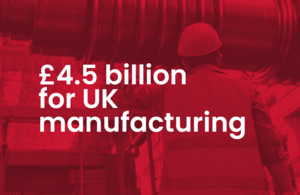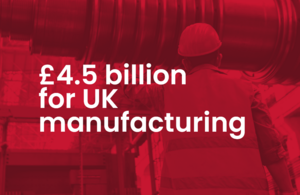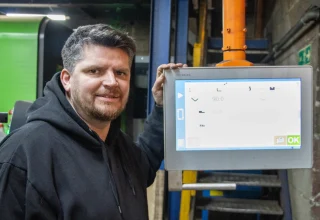
The government has today announced £4.5 billion in funding for British manufacturing to increase investment in eight sectors across the UK. The funding will be available from 2025 for five years, providing industry with longer term certainty about their investments.

- £4.5 billion for strategic manufacturing sectors including £960 million earmarked for clean energy
- Funding will be delivered to eight sectors key to economic growth, energy security, and levelling-up
- Part of wider government support to ensure UK is the best place to start, grow, and invest in manufacturing
Over £2 billion has been earmarked for the automotive industry and £975 million for aerospace, supporting the manufacturing, supply chain and development of zero emission vehicles, and investment in energy efficient and zero-carbon aircraft equipment.
Alongside this, the government has committed to £960 million for a Green Industries Growth Accelerator to support clean energy manufacturing, and £520 million for life sciences manufacturing to build resilience for future health emergencies and capitalise on the UK’s world-leading research and development.
With the entire manufacturing sector making up over 43% of all UK exports and employing around 2.6 million people, this funding is targeted at the UK’s strongest, world leading sectors; including where the industry is undergoing fundamental changes to remain at the forefront of the global transition to net zero, like the move to zero emission vehicles in the automotive industry.
The Green Industries Growth Accelerator investment will support the expansion of strong, home-grown, clean energy supply chains across the UK, including carbon capture, utilisation and storage, electricity networks, hydrogen, nuclear and offshore wind. This will enable the UK to seize growth opportunities through the transition to net zero, building on our world-leading decarbonisation track record and strong deployment offer.
The funding forms part of the Prime Minister’s pledge to grow the economy, and his focus on making decisions for the long-term, ensuring this funding doesn’t just focus on the most successful sectors today but looks ahead to how we keep pace internationally and build the UK’s expertise for the industries of the future.
Together with our existing manufacturing support and plans for net zero transition, this package will help unlock private investment, provide certainty to investors, boost energy security, and protect and create jobs. This approach has already mobilised £198 billion in public and private investment in low carbon energy deployment since 2010.
Today’s announcement comes ahead of the second Global Investment Summit later this month, which will showcase innovative companies from across the UK, with significant investment opportunities in sectors such as technology, sustainability, life sciences, advanced manufacturing, and creative industries.
It will also help ensure that the UK remains at the forefront of the global transition to net zero and can seize growth opportunities in the new green economy. The UK remains a world-leader in cutting emissions, having decarbonised faster than any G7 country since 1990 and set out clear plans to meet all our climate targets and deliver energy security.
Chancellor of the Exchequer, Jeremy Hunt, said:
“Britain is now the 8th largest manufacturer in the world, recently overtaking France. To build on this success, we are targeting funding to support the sectors where the UK is or could be world-leading.
“Our £4.5 billion of funding will leverage many times that from the private sector, and in turn will grow our economy, creating more skilled, higher-paid jobs in new industries that will be built to last.”
Business and Trade Secretary Kemi Badenoch said:
“The UK is a global hub for advanced manufacturing, with world-leading automotive, aerospace and maritime sectors. This package builds on recent investment wins, such as the £4 billion gigafactory, and the £600m invested to build the next generation of electric Minis, and ensures that the government can continue to help create jobs, grow the economy, and secure the future of great British manufacturing.”
Energy Security and Net Zero Secretary Claire Coutinho said:
“Today we are announcing nearly £1bn to back our green industries. While we’ve already attracted £200 billion in low carbon investment since 2010, with another £100 billion expected by 2030, this will unlock even more. We have long been energy pioneers in advanced manufacturing, and this will allow us to carry on that great British tradition.”
Today, the government has also published its response to Professor Dame Angela McLean’s review of the role that regulation and standards can play in driving innovation and growth in advanced manufacturing.
The government accepts all 14 recommendations in the industry expert-backed report which builds on the UK’s role as a global leader in setting industrial standards and sets out how, with the right regulations, advanced manufacturing processes can enhance safety and support the drive to net zero and a more sustainable economy.
Among the recommendations accepted is to accelerate the deployment of digital twins, which enables companies to create accurate digital replicas of the full manufacturing process. Used across a range of sectors, digital twins have seen significant uptake in the automotive sector including car production where they offer a transformative approach to product development, manufacturing and maintenance, helping firms test how to fix problems or make processes more efficient.
To boost growth in small and medium sized manufacturing businesses more widely, it has also been announced today that the government will expand the Made Smarter Adoption programme, offering the scheme to all English regions in 2025-26 before working with the Devolved Administrations to explore making the programme UK-wide from 2026-27.
The programme helps small and medium sized manufacturing companies to use advanced digital technologies which can reduce carbon emissions and drive-up productivity, and its expansion will also involve inclusion of digital internships.
Stephen Phipson, CEO of Make UK, the manufacturers’ organisation said:
“Make UK has long campaigned for Made Smarter to be a fully national scheme so that all SME manufacturers can benefit from the expertise the programme delivers and we are delighted at today’s decision from government to commit to a national rollout.
“Made Smarter has already transformed thousands of companies in the North East, North West, West Midlands and Yorkshire & the Humber and now it can help turbo-charge industrial digitalisation in SMEs across the whole of the country. The end-to-end specialist support the programme delivers has successfully helped smaller businesses dramatically boost productivity, improve energy efficiency, drive growth, upskill roles and deliver new jobs in digital skills to create workforces of the future which will allow Britain’s smaller manufacturers to continue to grow and remain globally competitive.”
Additionally, the government has today committed to extend the Connected and Automated Mobility Research and Development programme with up to £150 million of funding between 2025-26 and 2029-30. This will help the UK secure first-mover advantage in the deployment of self-driving vehicles and services.
The UK’s first Battery Strategy is also expected to be published next week, which will outline the Government’s activity to achieve a globally competitive battery supply chain in the UK by 2030 that supports economic prosperity and the Net Zero transition.
We have also set out our plan to launch a Hydrogen industry taskforce, delivered in partnership with the Hydrogen Innovation Initiative and Innovate UK, supporting our ambition to maximise investment opportunities for UK manufacturing of hydrogen propulsion systems.
The government will set out more about its offer to the manufacturing sector next week with the publication of the Advanced Manufacturing Plan.
Further Information
- Further information, including on the application processes, will be made available by the government in due course.
- The eight manufacturing sub-sectors that will be able to apply for funding are:
- Automotive
- Aerospace
- Life sciences
- Clean energy (carbon capture, utilisation and storage, electricity networks, hydrogen, nuclear, and offshore wind)
- This targeted funding for sectors of economic strategic importance is in addition to wider support for the manufacturing sector such as:
- the British Industry Supercharger ensuring energy costs for key industries like steel, metals, chemicals, and paper producers are in line with other major economies around the world
- the Industrial Energy Transformation Fund supporting the deployment of technologies that is enabling hundreds of businesses with high energy use to transition to a low carbon future
- the lowest corporation tax in the G7
- The UK also has a world-leading track record on green deployment, and comprehensive, clear, and considered plans for our net zero transition.
- In Powering Up Britain, we have set out detailed deployment plans for every sector of the economy through the net zero transition. These include long-term frameworks to provide investors with certainty, from the Emissions Trading Scheme (ETS) to the Contracts for Difference Scheme. These are supported by public spending, with £30 billion for the green industrial revolution confirmed at Spending Review 2021, and a further £6 billion for energy efficiency and up to £20 billion for Carbon Capture, Utilisation and Storage (CCUS) announced since then.













